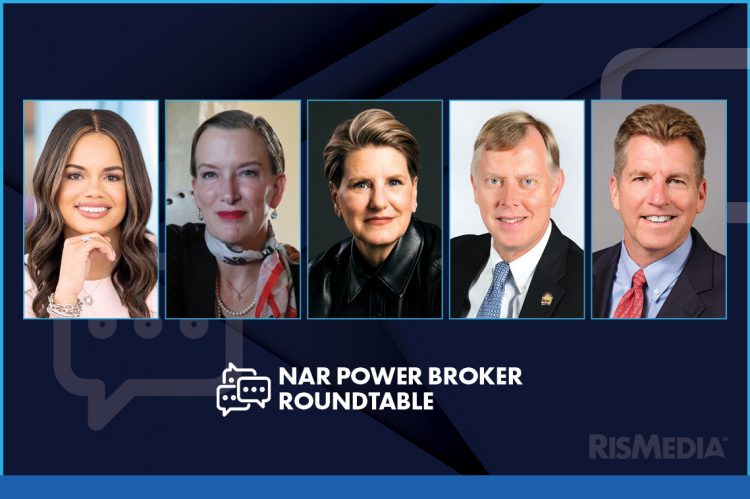The Power Broker Roundtable is brought to you by the National Association of REALTORS® (NAR) and Kymber Lovett-Menkiti, NAR’s Broker Relations Liaison. Watch for this column each month, where we address broker issues, concerns and milestones.
Participants pictured above are, from left to right:
Moderator:
Kymber Lovett-Menkiti, President, Keller Williams Capital Properties, Washington D.C., Broker Liaison for the National Association of REALTORS® (NAR)
Panelists:
Lezley Charles, Sales Manager, Kuper Sotheby’s International Real Estate, Austin, Texas
Diane Glass, CEO, Berkshire Hathaway HomeServices Chicago, Chicago, Illinois
John Horning, Executive Vice President, Shorewest REALTORS®, Brookfield, Wisconsin
Bill Soffel, President/CEO, ERA Team VP Real Estate, Chautauqua, New York
Kymber Lovett-Menkiti: Data tells us more than 60,000 agents exited the business in the first six months of this year and tens of thousands more are expected to leave, as many who began during the accelerated market will not stay in the business in a more normalized market. The challenge for leaders, most of whom have already tightened their belts, is to keep their best agents and attract a slate of new high-producers. What are agents looking for now, and how can we best provide it within budget? What are the strategies for remaining resilient in a less-than-certain market?
Lezley Charles: What agents want in a shifting market is a partner to help guide them through it. It’s less about compensation, we think, and more about training and support—help with secure appointments, bringing on inventory, marketing and technical support.
Diane Glass: Agents are demanding more because they know they can do their best work when brokers are with them every step of the way–and they are right to have high expectations. That’s the reasoning behind our Agent Insight Council, a group of agents who meet regularly with leadership to provide insight on company initiatives.
John Horning: Support for our team is critical in any market, but especially now, when so many want specialized skills training. My brother and I have been visiting each of our 25 offices to talk directly with agents, and it’s less about money than about making their lives easier. It’s about taking administrative and technical work off their hands so they can focus on what they do best.
Bill Soffel: In our resort-area market, we’ve never really slowed down. But even in a strong market, agents know that this is a cyclical business. When demand slows, they look for more help, and agents who came on during a hot market need schooling in the fundamentals. As a traditional brokerage, we can’t compete on higher commission splits, but we can and do compete in terms of providing support in technology, marketing and transaction management.
KLM: According to NAR, all four regions of the country recorded year-over-year sales declines at the end of the second quarter. Agents and brokers are understandably nervous. In fact, the data tells us more than 60,000 agents exited the business in the first six months of this year and tens of thousands more are expected to leave, as many who began during the accelerated market of the past few years will not stay in the business in a more normalized market. The challenge for leaders, most of whom have already tightened their belts, is to keep their best agents and attract a slate of new high producers to continue to grow the business. What are agents looking for now, and how can we best provide it within budget? What are the strategies for remaining resilient in a less-than-certain market?
LC: What agents want in a shifting market is a partner to help guide them through it. It’s less about compensation, we think, and more about training and support—help with secure appointments, bringing on inventory, marketing and technical support.
DG: Agents are demanding more because they know they can do their best work when brokers are with them every step of the way–and they are right to have high expectations. That’s the reasoning behind our Agent Insight Council, a group of agents who meet regularly with leadership to provide insight on company initiatives.
JH: Support for our team is critical in any market, but especially now, when so many want specialized skills training. My brother and I have been visiting each of our 25 offices to talk directly with agents, and I agree with Lezley that it’s less about money than about making their lives easier. It’s about taking administrative and technical work off their hands so they can focus on what they do best.
BS: In our resort-area market, we’ve never really slowed down. But even in a strong market, agents know that this is a cyclical business. When demand slows, they look for more help, and agents who came on during a hot market need schooling in the fundamentals. As a traditional brokerage, we can’t compete on higher commission splits, but we can and do compete in terms of providing support in technology, marketing and transaction management.
KM: Can we drill down a bit on some of the specific agent-support measures you’re taking?
LC: I like to have lunch with my agents, often one-on-one, to get to know them better and get a better understanding of what they need to succeed.
DG: Agents want to feel valued and respected. Our Belonging Council explores ways to make the industry and our company more diverse, more equitable and more inclusive. We have a monthly book group that is near and dear to my heart—and for agents whose priority is giving back, our Kindness Foundation and Foundation for Housing Equity provide ongoing charitable support.
JH: We have amped up our community involvement. This year we sponsored Summerfest in Milwaukee, where our whole team, their families and their clients enjoyed a world-class musical experience.
KM: How do you balance your efforts to provide more with the need for budget restraint?
JH: Some things don’t require a bigger spend. It’s impossible to calculate the benefits of a positive mindset, for example. We work hard with our leadership to boost positivity, to help our team compete with confidence and unbeatable market knowledge.
LC: Sometimes it’s a matter of shifting resources to do more with less—like partnering smartly with mortgage companies and other entities so we can offer more, and economically, to both our agents and customers.
DG: Top agents want zero downtime and a frictionless experience from day one. We take special care to make agent onboarding a smooth process and integrate IT, marketing and administrative services so that agents have everything they need right away.
BS: We understand you can’t be all things to all people. But we also know that top agents want to associate with dynamic, growing companies. We are not only in recruiting mode, but also into mergers and acquisitions. We’ve downsized our office space by half, but our mini offices are fully equipped, lively and inviting, and we remain in full acquisition mode for the second half of this year.
DG: The common theme here is that top performers are looking for support, support and more support from their brokerage. Having experienced people by your side, backed by a company you can trust, can make all the difference.
BS: And we should all check in on our value proposition to be sure we are delivering on our promises.
For more information, visit https://www.nar.realtor/.












